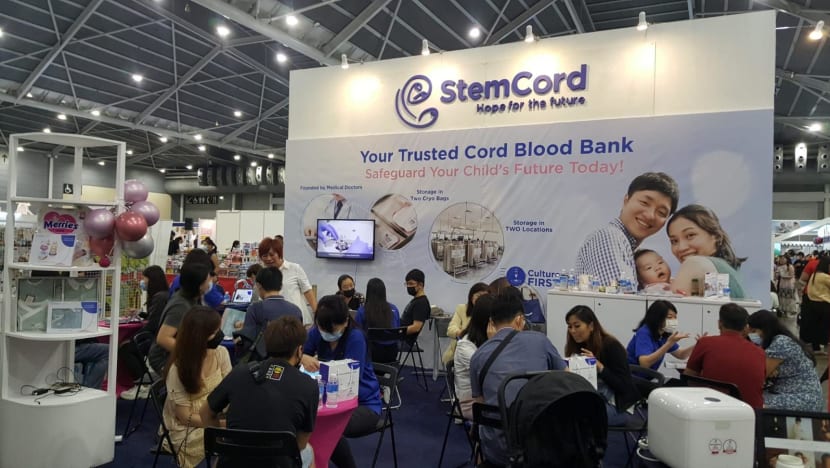Freebies, goody bags and pressure tactics: Parents speak up about cord blood banks' marketing methods
Four parents say they were frequently approached by cord blood banks' staff at baby fairs, hospitals and clinics, who offered freebies and pressured parents into signing up.

A Cordlife branch at Mount Elizabeth Novena Hospital on Dec 1, 2023. (Photo: TODAY/Ooi Boon Keong)

This audio is generated by an AI tool.
SINGAPORE: When first-time mum Grace Tan was pregnant with her daughter two years ago, cord blood banks' staff often came up to her at baby fairs, armed with attractive goody bags and freebies.
“The experience was always pleasant until it got to the eye-watering sums we'd have to pay,” said the 38-year-old.
Ms Tan, who is the co-founder of vending machine provider Avatar Tech, pointed out that the sales representatives who approached her seemed to suggest that everybody was storing their children’s cord blood with private banks.
“Their attitude was more of: ‘Everyone's doing this. So, when are you going to sign up?’ Not if, but when,” she said, adding that they tried to get her to sign up “right there and then”.
Ms Tan ended up donating her daughter’s cord blood to the Singapore Cord Blood Bank – the only public cord blood bank in the country – after she was born in November 2022.
But the mother-of-one admitted to feeling as though she might miss out if she did not go with the private banking route.
“I did feel like what if my baby needs the cord blood later on in life. Slim chance, but still. Then I figured … it's donated but it doesn't mean it's used up,” Ms Tan said.
“She might still be able to access it later on or get priority to access someone else's donated cord blood, which might be more helpful depending on what her medical situation is.”
Cord blood banking has been in the spotlight in Singapore after lapses by private firm Cordlife led to thousands of cord blood units being damaged.
It was revealed last November that seven of its 22 storage tanks were exposed to temperatures above the acceptable limit of -150 degrees Celsius.
About 2,200 cord blood units were damaged and the Ministry of Health (MOH) ordered further investigations into the other Cordlife tanks. Last month, the ministry said another 5,300 cord blood units had been deemed "non-viable". These had been stored in a tank and a dry shipper, which is intended for transport and not long-term storage.
Cordlife’s board of directors lodged a police report on Apr 17 over the “potential wrongdoings” of former employees. This came after seven people in its management team had already been arrested.
THEY USED "SUCCESS STORIES": PARENT
Other parents CNA spoke to had similar experiences with cord blood bank staff at hospitals and even during visits to gynaecologists.
Analyst Nathaniel Koh experienced this "borderline" pushiness when his wife was expecting their first child in 2021.
"They always approach. They come up to you and market their product when you are at the gynae," said Mr Koh, 41.
“But you are at the clinic. And you are unlikely to leave the clinic because of that. So (I had no choice but to) listen," he said. Mr Koh did not sign up.
One mother, who gave birth to her son last year, said salespeople approached her both before and after her check-ups at the hospital.
She did not mind it at first as she “genuinely wanted to know more”, said the 29-year-old, who wanted to remain anonymous. She even left her contact number with them.
But it felt “a little pushy” when she kept receiving calls. The mother-of-one, who works in marketing, recalled how the sales representatives tried to persuade her to sign up for their service.
“After I voiced out that the price was a little high, they would try to push for the (cheaper) packages, saying that it could really save my child or future children if anything happened,” she said.
Although she decided not to store or donate her child’s cord blood, she too, like Ms Tan, felt that her baby might be losing out.
“It felt (as though) if I didn’t do it and if anything happens to my baby, I might look back and regret that I didn’t buy their product.”
Mother-of-two Priscilla Goh similarly recalled how cord blood banking staff were always present at her gynaecologist's clinic. They usually offered expectant parents branded freebies, such as a baby bib or a mat.
Ms Goh, who works in the media, said she was "pretty firm" in declining them.
They used "success stories" of siblings using one another's cord blood, and what would happen if the cord blood wasn't saved, she said, remembering feeling annoyed at their frequent and repeated sales pitches.
After doing some research and talking to a scientist friend, the 34-year-old and her husband decided to donate the cord blood to the Singapore Cord Blood Bank. They decided it might someday save someone else's life, and that they were less likely to use their own cord blood, especially in the case of genetic disorders.

"NOT PERMITTED TO OVERSELL": CORD BLOOD BANK
Both StemCord and Cordlife told CNA that they participate in pregnancy- and baby-related events such as baby fairs, talks and seminars to educate parents and create awareness about cord blood banking.
StemCord also uses its website and social media channels to share information about cord blood banking, and places brochures at obstetrics and gynaecological clinics, said CEO Valerie Wong.
“All our sales staff are trained to comply (with) standardised messaging to parents and we are not permitted to oversell nor give non-factual information,” she said.
In response to CNA’s queries, a Cordlife spokesperson said the company “strives to maintain ethical business practices”, which include transparency and honesty in its marketing efforts.
“At all times, we are careful to ensure that all the information provided to expectant parents about cord blood banking and our services is based on facts and scientific information supported by peer-reviewed papers,” said Cordlife.
Parents are also provided information about the risks in the process of cord blood collection and retrieval of the required maternal blood samples, as well as the availability of alternative sources of stem cells and treatment.
They can also “change their minds” before the delivery, its spokesperson added.
The third private cord blood bank in Singapore, Cryoviva, did not respond to CNA’s request for comments.
In response to CNA’s queries, the Ministry of Health said it investigated three breaches of advertising regulations by cord blood banking firms between 2021 and 2023.
Cord blood banking is a licensed healthcare service in Singapore, and licensees must adhere to regulations when marketing their services.
This includes ensuring that the content in their advertisement is factually accurate, not misleading, and does not provide information that amounts to soliciting or encouraging the use of the service, said MOH.
They can only promote their services in approved advertising media such as brochures, flyers and the internet. They also must obtain written consent from an individual before giving out brochures and other media with the company's contact information, said the ministry.
Licensees who breach the regulations face a fine of up to S$20,000 (US$14,700) and up to 12 months in jail.
PARENTS' EMOTIONS
Marketing experts said the emotions of expectant parents may be something that such businesses look to exploit.
Expectant parents are often in a heightened emotional state, particularly around the time of childbirth, said National University of Singapore's (NUS) Dr Samer Elhajjar.
Campaigns that accentuate the potential benefits of cord blood banking could resonate with such emotions, added the senior lecturer from NUS Business School's Department of Marketing.
Noting that the decision to pursue cord blood banking typically occurs around childbirth, Dr Elhajjar said: “Employing aggressive marketing tactics at this juncture can instil a sense of urgency, prompting parents to hastily make a decision without affording themselves adequate time for thorough research and deliberation regarding their options.”
Phrases such as "investing in your child's future" and "a chance for a lifetime" may push parents into a quick decision, despite the statistically low likelihood of requiring the stored cells, according to Dr Elhajjar.
Singapore University of Social Sciences’ (SUSS) Lau Kong Cheen pointed out that marketing messages could trigger a fear of the child being inflicted with a disease that could potentially be cured by stem cells from their cord blood.
With this sense of “fear” triggered, a sense of "control" is introduced when the prospective client is offered the chance to take things into their own hands by choosing to preserve the child's cord blood, said the head of marketing at SUSS' School of Business.
Assoc Prof Lau said these marketing tactics may come across as aggressive due to the cord blood bank’s need to close sales within a narrow window of time when a woman is pregnant, and to fill up vacancies at storage facilities.
With declining birth rates, the market for cord blood banks was also "slowing down" with stiff competition from both public and private cord blood banks, he noted.
They cautioned parents against being emotionally drawn into the discussion, which could result in hasty decisions.
Dr Elhajjar told parents to look out for pressure phrases such as "limited time offer" or "only a few left".
"It's crucial to beware of false claims and conduct thorough research on products or services before making any decisions."




















